Abstract
Gram-negative sepsis is an increasingly common problem, with up to 300,000 cases occurring each year in the United States alone. Despite the ongoing development of new antibiotics, mortality from gram-negative sepsis remains unacceptably high. To stimulate earlier therapeutic intervention by physicians, a new set of broad definitions has been proposed to define the systemic inflammatory response characteristic of sepsis. In this review, the signs and symptoms of this progressive, injurious process are reviewed and its management is discussed, as are the mechanisms by which bacterial endotoxin triggers the biochemical events that lead to such serious complications as shock, adult respiratory distress syndrome, and disseminated intravascular coagulation. These events often occur even when appropriate antimicrobial therapy has been instituted. An increased understanding of the structure of endotoxin and its role in the development of sepsis, together with advances in hybridoma technology, has led to the development of monoclonal antibodies that bind to endotoxin and significantly attenuate its adverse effects. These agents promise to substantially reduce the morbidity and mortality associated with gram-negative sepsis.
Full text
PDF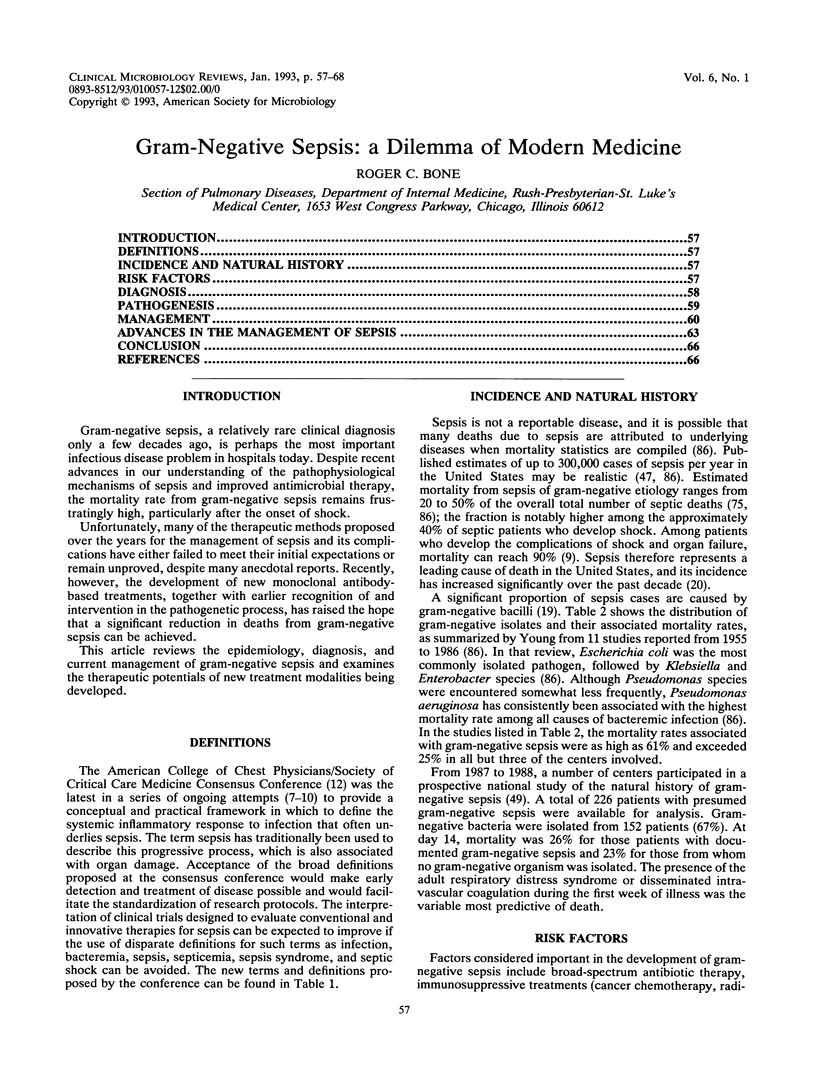
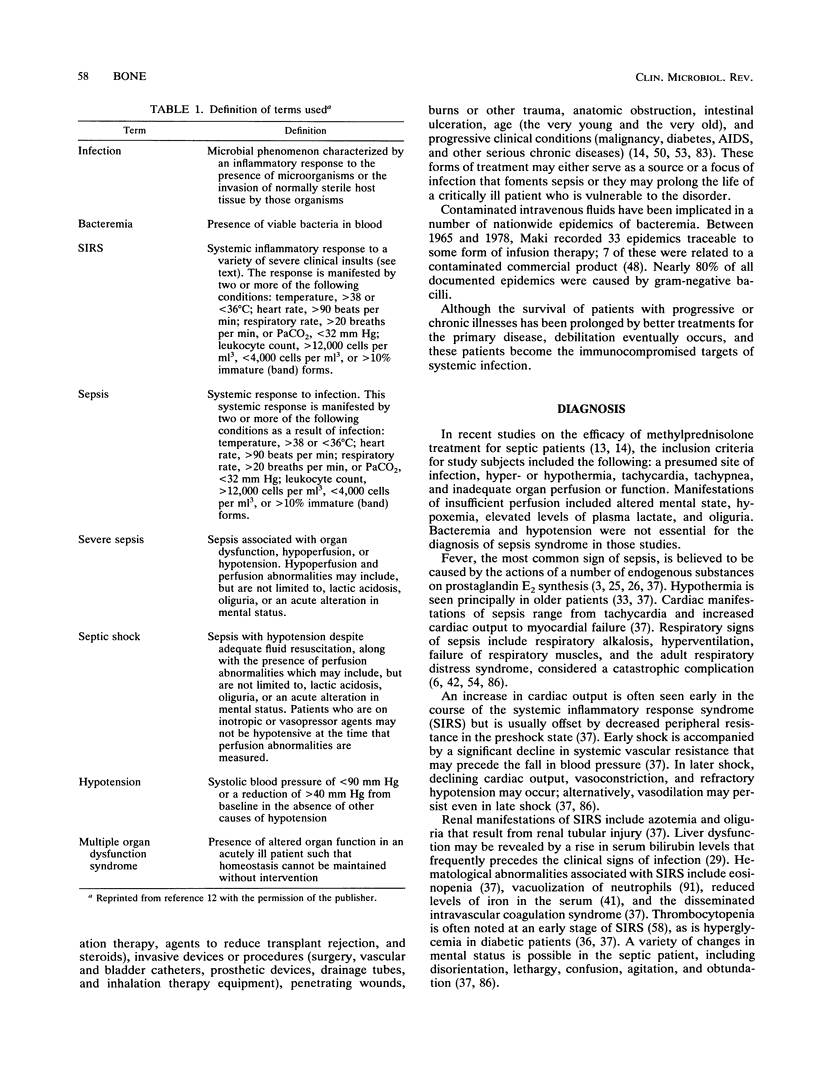
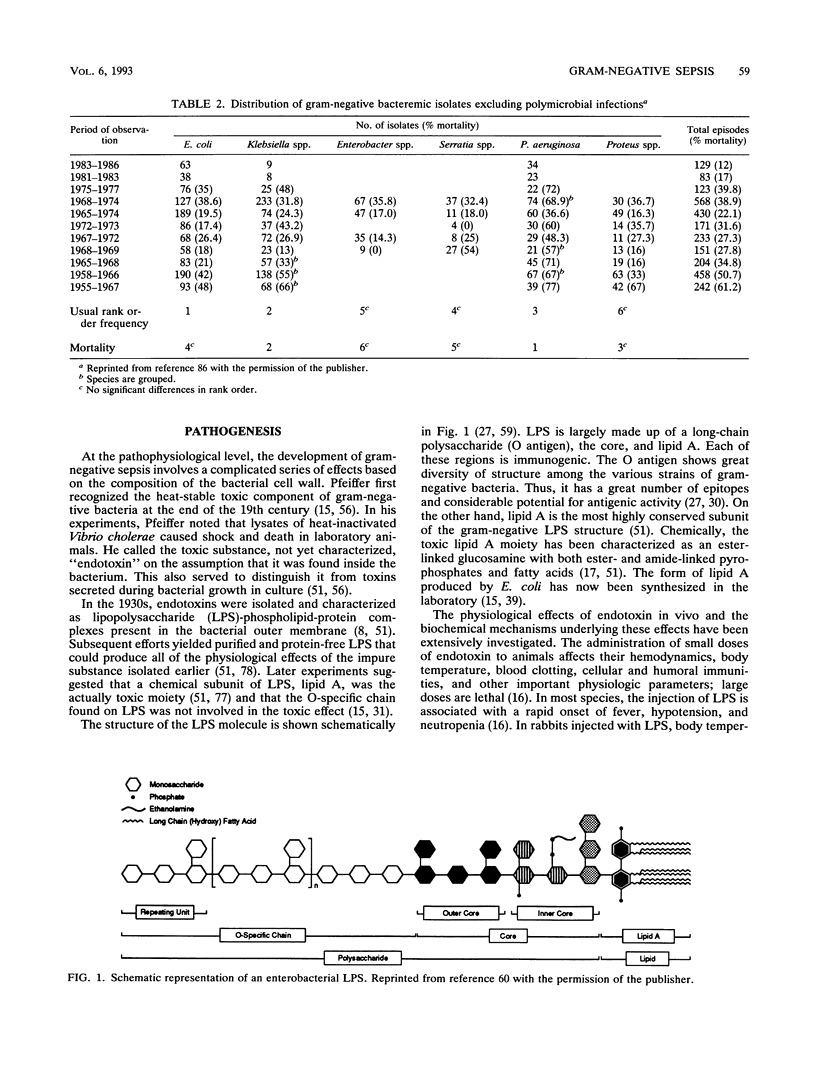
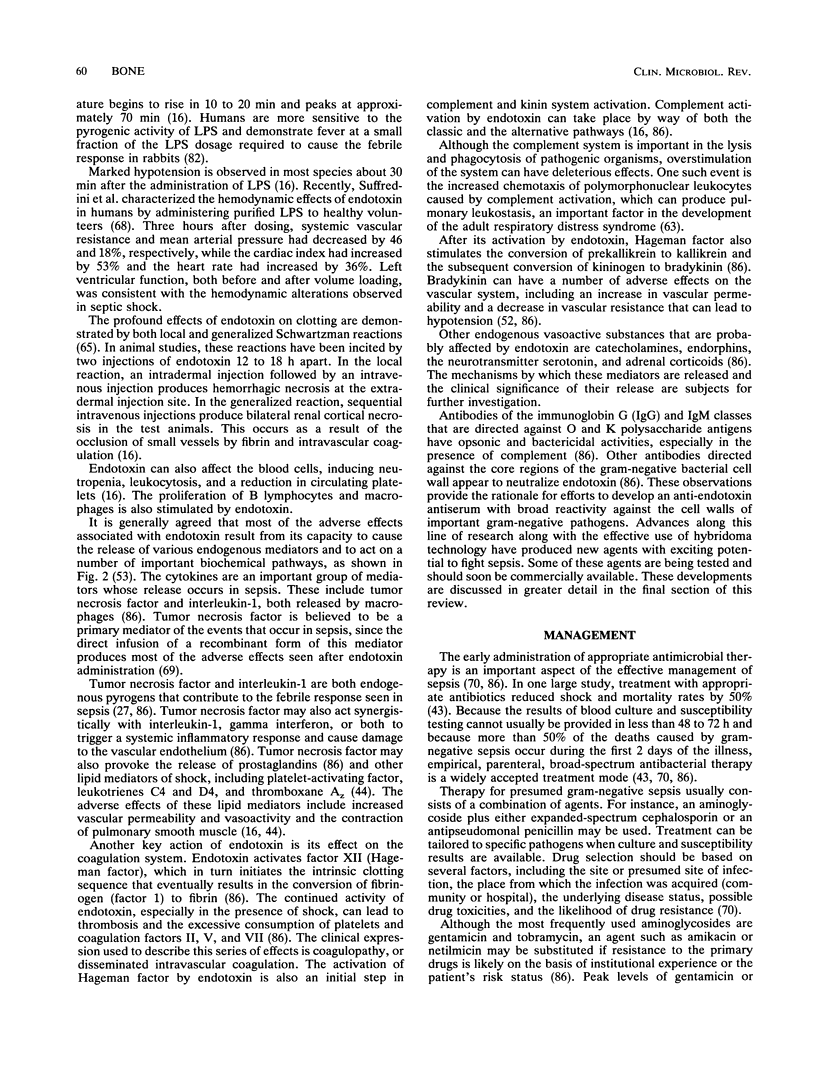
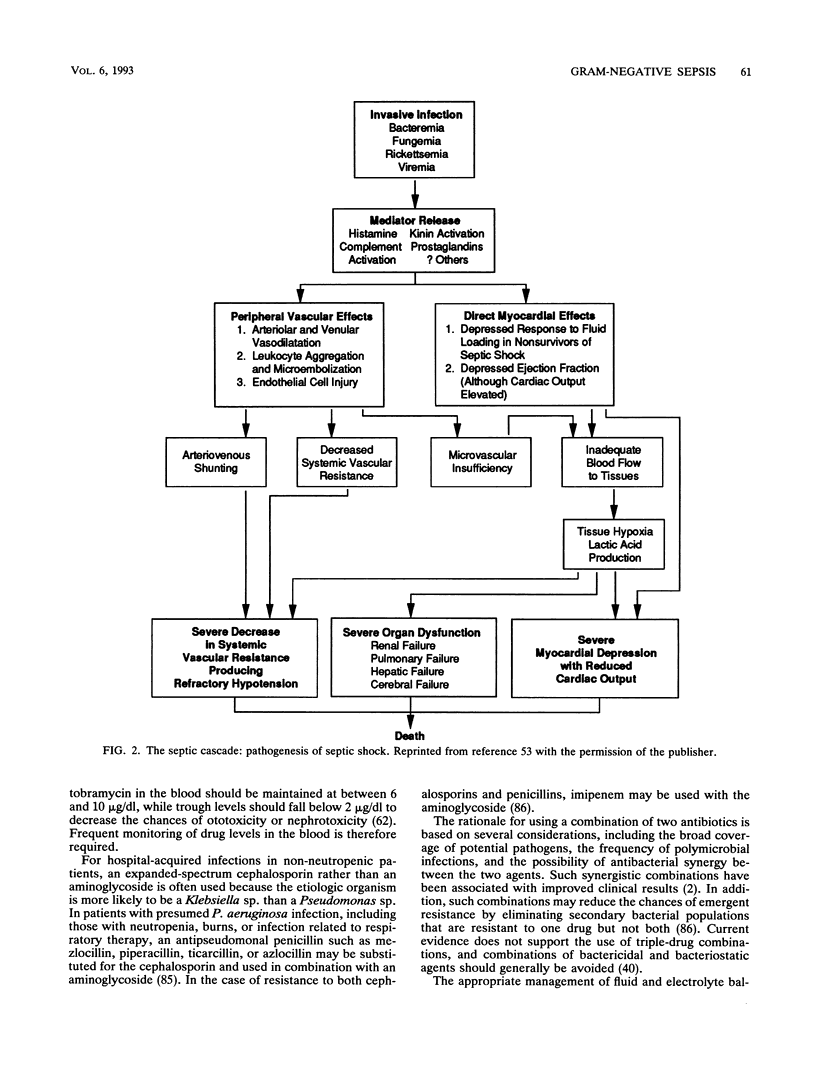
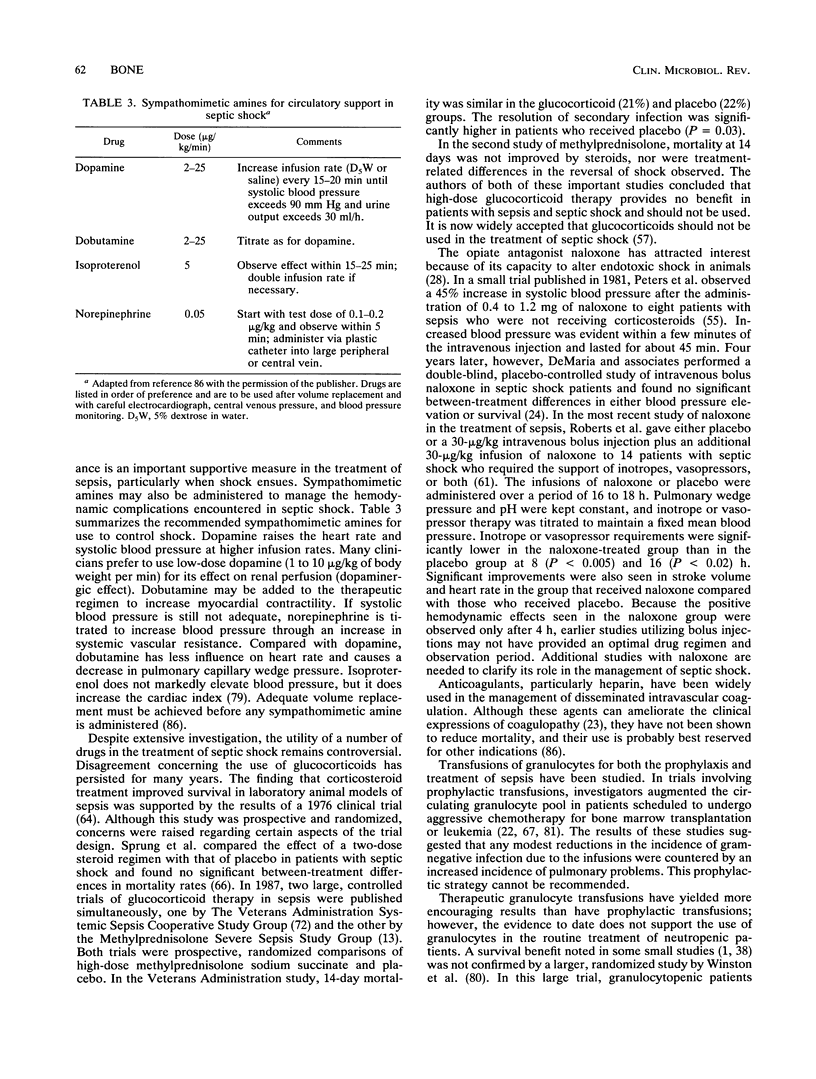
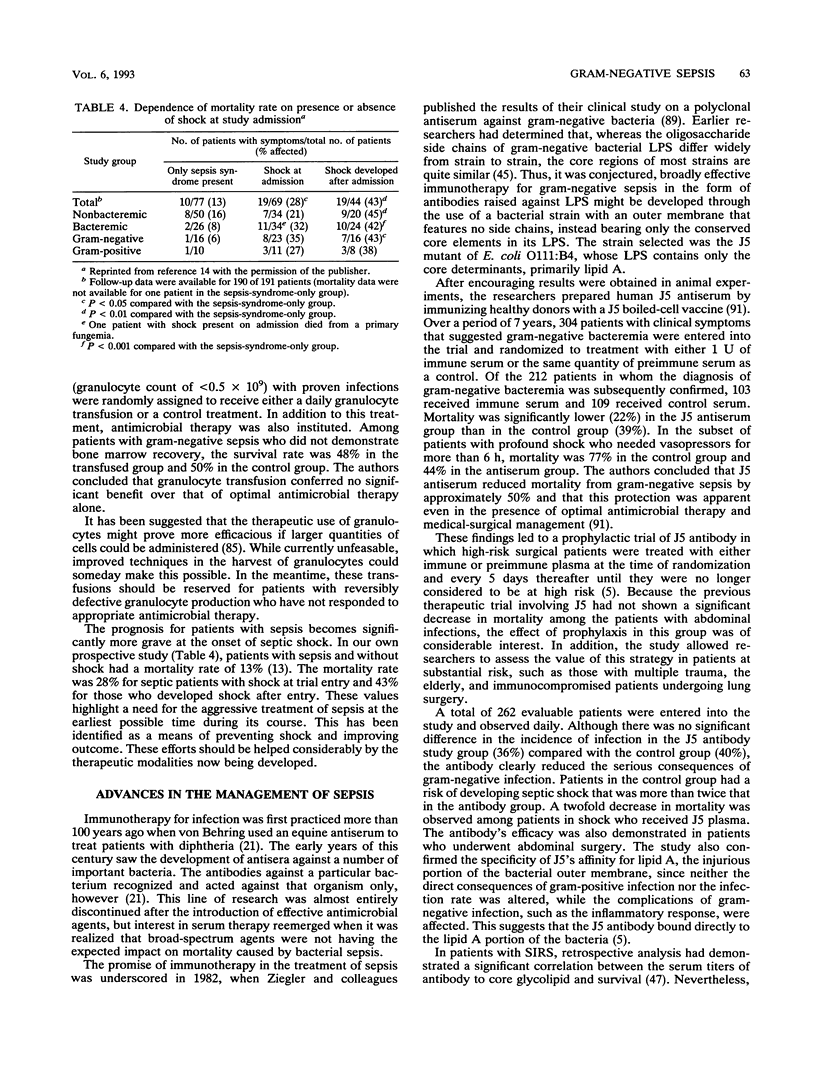
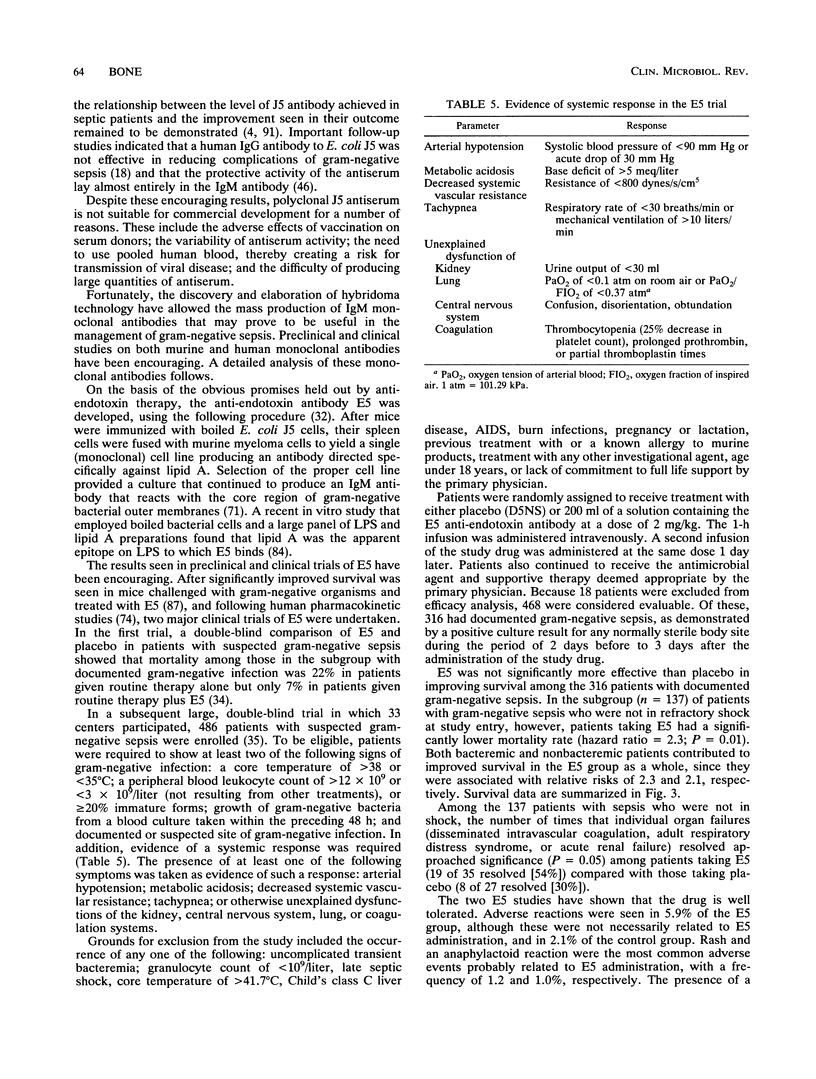
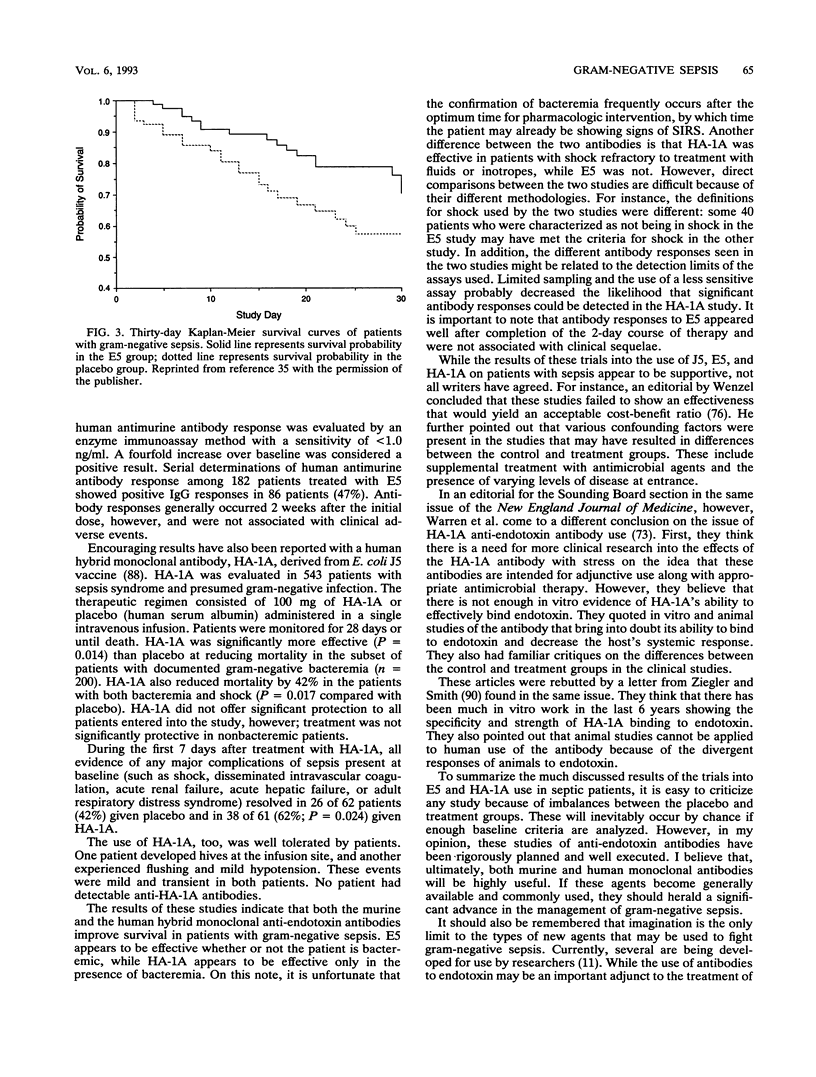
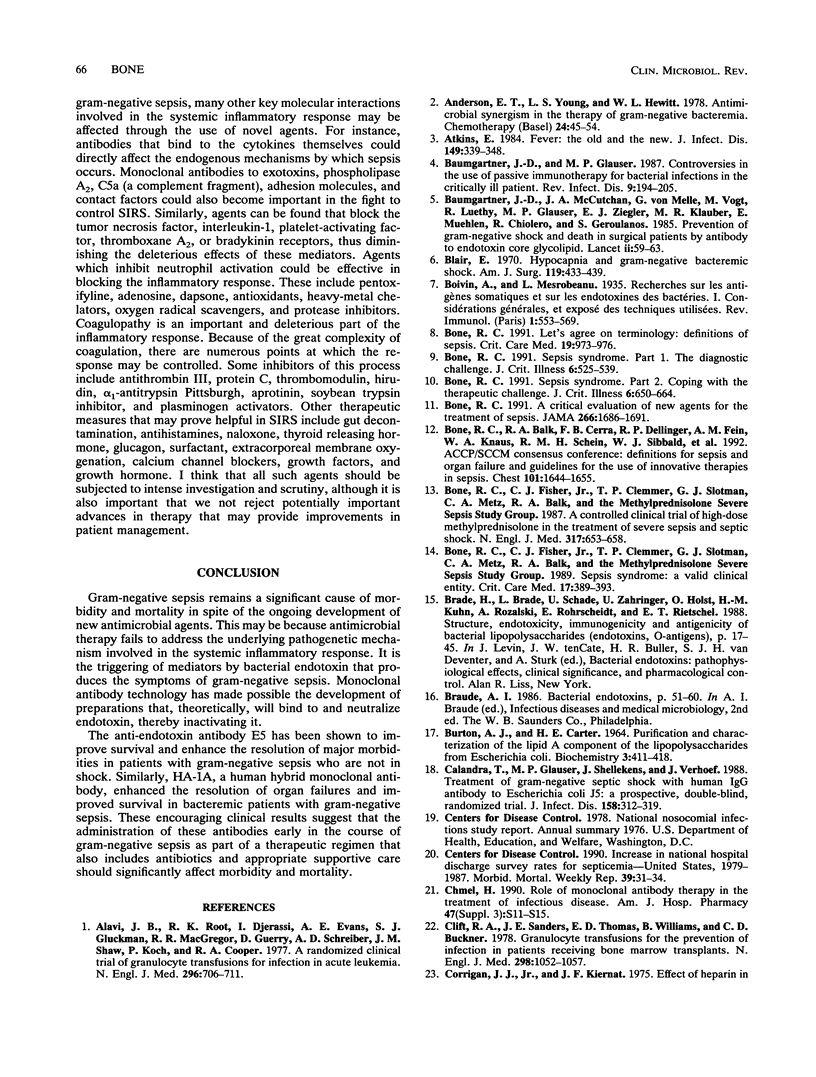
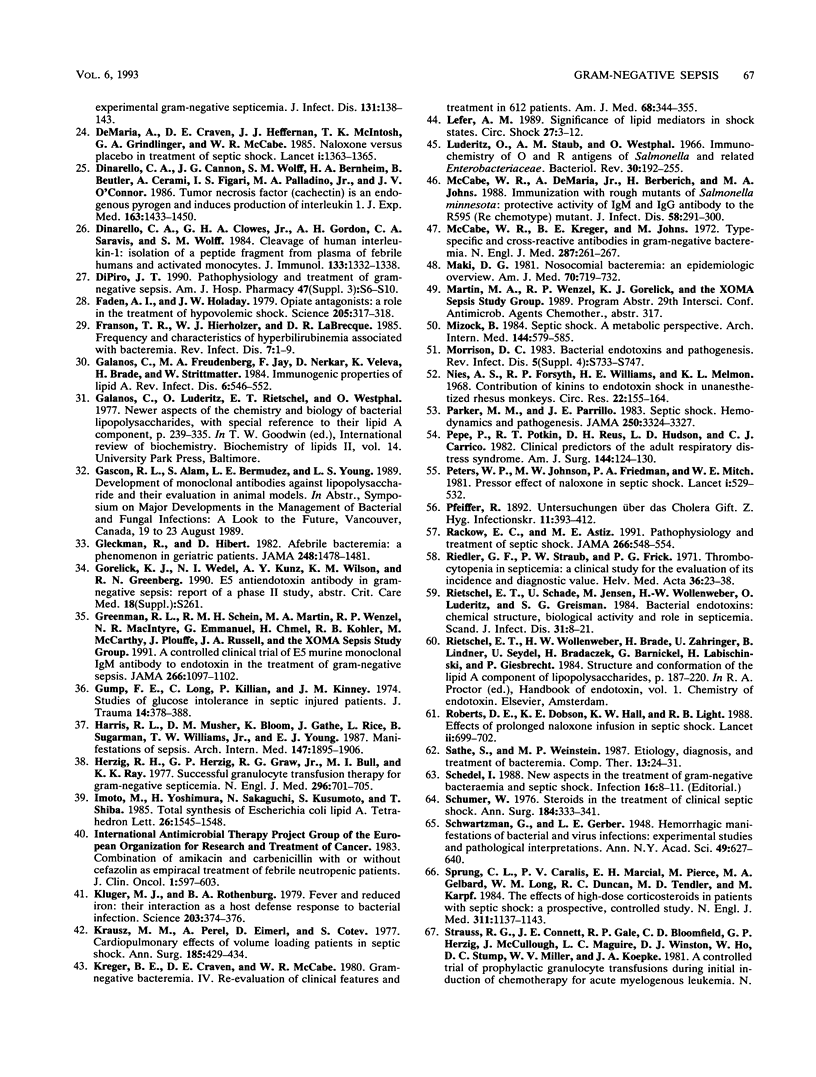
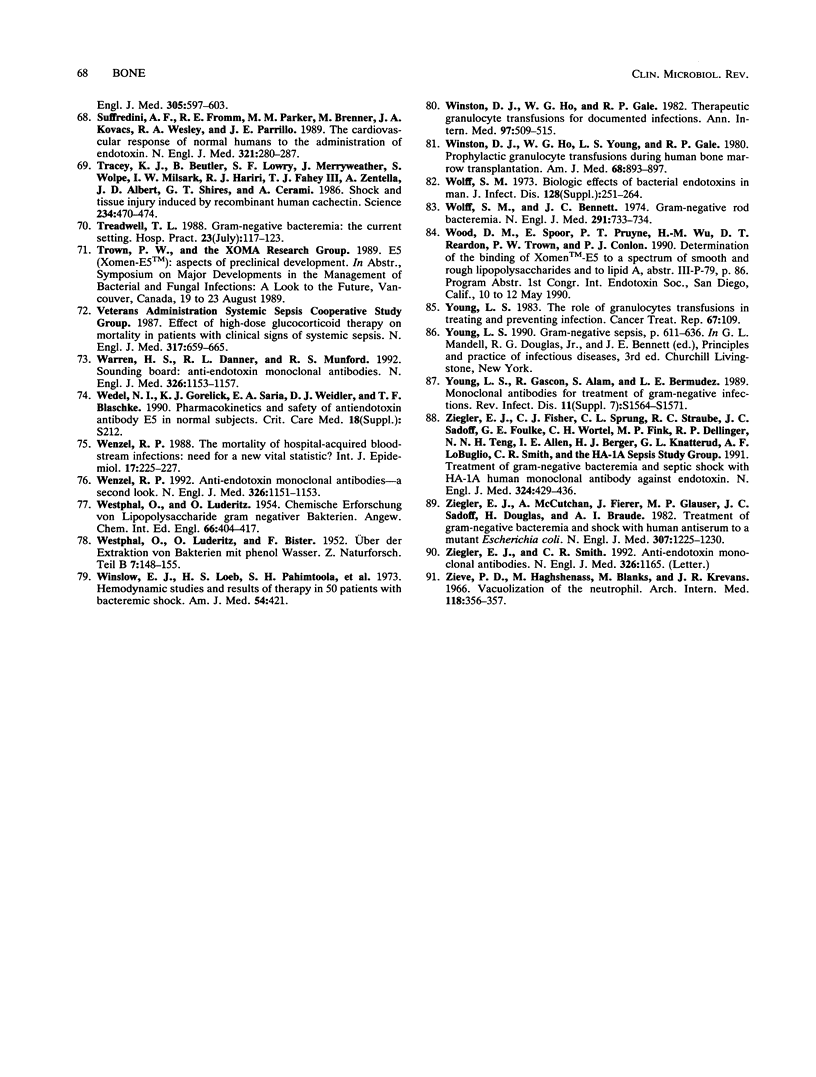
Selected References
These references are in PubMed. This may not be the complete list of references from this article.
- Alavi J. B., Root R. K., Djerassi I., Evans A. E., Gluckman S. J., MacGregor R. R., Guerry D., Schreiber A. D., Shaw J. M., Koch P. A randomized clinical trial of granulocyte transfusions for infection in acute leukemia. N Engl J Med. 1977 Mar 31;296(13):706–711. doi: 10.1056/NEJM197703312961302. [DOI] [PubMed] [Google Scholar]
- Anderson E. T., Young L. S., Hewitt W. L. Antimicrobial synergism in the therapy of gram-negative rod bacteremia. Chemotherapy. 1978;24(1):45–54. doi: 10.1159/000237759. [DOI] [PubMed] [Google Scholar]
- Atkins E. Fever: the old and the new. J Infect Dis. 1984 Mar;149(3):339–348. doi: 10.1093/infdis/149.3.339. [DOI] [PubMed] [Google Scholar]
- BURTON A. J., CARTER H. E. PURIFICATION AND CHARACTERIZATION OF THE LIPID A COMPONENT OF THE LIPOPOLYSACCHARIDES FROM ESCHERICHIA COLI. Biochemistry. 1964 Mar;3:411–418. doi: 10.1021/bi00891a018. [DOI] [PubMed] [Google Scholar]
- Baumgartner J. D., Glauser M. P. Controversies in the use of passive immunotherapy for bacterial infections in the critically ill patient. Rev Infect Dis. 1987 Jan-Feb;9(1):194–205. doi: 10.1093/clinids/9.1.194. [DOI] [PubMed] [Google Scholar]
- Baumgartner J. D., Glauser M. P., McCutchan J. A., Ziegler E. J., van Melle G., Klauber M. R., Vogt M., Muehlen E., Luethy R., Chiolero R. Prevention of gram-negative shock and death in surgical patients by antibody to endotoxin core glycolipid. Lancet. 1985 Jul 13;2(8446):59–63. doi: 10.1016/s0140-6736(85)90176-x. [DOI] [PubMed] [Google Scholar]
- Blair E. Hypocapnia and gram-negative bacteremic shock. Am J Surg. 1970 Apr;119(4):433–439. doi: 10.1016/0002-9610(70)90146-7. [DOI] [PubMed] [Google Scholar]
- Bone R. C. A critical evaluation of new agents for the treatment of sepsis. JAMA. 1991 Sep 25;266(12):1686–1691. [PubMed] [Google Scholar]
- Bone R. C., Balk R. A., Cerra F. B., Dellinger R. P., Fein A. M., Knaus W. A., Schein R. M., Sibbald W. J. Definitions for sepsis and organ failure and guidelines for the use of innovative therapies in sepsis. The ACCP/SCCM Consensus Conference Committee. American College of Chest Physicians/Society of Critical Care Medicine. Chest. 1992 Jun;101(6):1644–1655. doi: 10.1378/chest.101.6.1644. [DOI] [PubMed] [Google Scholar]
- Bone R. C., Fisher C. J., Jr, Clemmer T. P., Slotman G. J., Metz C. A., Balk R. A. A controlled clinical trial of high-dose methylprednisolone in the treatment of severe sepsis and septic shock. N Engl J Med. 1987 Sep 10;317(11):653–658. doi: 10.1056/NEJM198709103171101. [DOI] [PubMed] [Google Scholar]
- Bone R. C., Fisher C. J., Jr, Clemmer T. P., Slotman G. J., Metz C. A., Balk R. A. Sepsis syndrome: a valid clinical entity. Methylprednisolone Severe Sepsis Study Group. Crit Care Med. 1989 May;17(5):389–393. [PubMed] [Google Scholar]
- Bone R. C. Let's agree on terminology: definitions of sepsis. Crit Care Med. 1991 Jul;19(7):973–976. doi: 10.1097/00003246-199107000-00024. [DOI] [PubMed] [Google Scholar]
- Brade H., Brade L., Schade U., Zähringer U., Holst O., Kuhn H. M., Rozalski A., Röhrscheidt E., Rietschel E. T. Structure, endotoxicity, immunogenicity and antigenicity of bacterial lipopolysaccharides (endotoxins, O-antigens). Prog Clin Biol Res. 1988;272:17–45. [PubMed] [Google Scholar]
- Calandra T., Glauser M. P., Schellekens J., Verhoef J. Treatment of gram-negative septic shock with human IgG antibody to Escherichia coli J5: a prospective, double-blind, randomized trial. J Infect Dis. 1988 Aug;158(2):312–319. doi: 10.1093/infdis/158.2.312. [DOI] [PubMed] [Google Scholar]
- Chmel H. Role of monoclonal antibody therapy in the treatment of infectious disease. Am J Hosp Pharm. 1990 Nov;47(11 Suppl 3):S11–S15. [PubMed] [Google Scholar]
- Clift R. A., Sanders J. E., Thomas E. D., Williams B., Buckner C. D. Granulocyte transfusions for the prevention of infection in patients receiving bone-marrow transplants. N Engl J Med. 1978 May 11;298(19):1052–1057. doi: 10.1056/NEJM197805112981904. [DOI] [PubMed] [Google Scholar]
- Corrigan J. J., Jr, Kiernat J. F. Effect of heparin in experimental gram-negative septicemia. J Infect Dis. 1975 Feb;131(2):138–143. doi: 10.1093/infdis/131.2.138. [DOI] [PubMed] [Google Scholar]
- DeMaria A., Carven D. E., Heffernan J. J., McIntosh T. K., Grindlinger G. A., McCabe W. R. Naloxone versus placebo in treatment of septic shock. Lancet. 1985 Jun 15;1(8442):1363–1365. doi: 10.1016/s0140-6736(85)91787-8. [DOI] [PubMed] [Google Scholar]
- DiPiro J. T. Pathophysiology and treatment of gram-negative sepsis. Am J Hosp Pharm. 1990 Nov;47(11 Suppl 3):S6–10. [PubMed] [Google Scholar]
- Dinarello C. A., Cannon J. G., Wolff S. M., Bernheim H. A., Beutler B., Cerami A., Figari I. S., Palladino M. A., Jr, O'Connor J. V. Tumor necrosis factor (cachectin) is an endogenous pyrogen and induces production of interleukin 1. J Exp Med. 1986 Jun 1;163(6):1433–1450. doi: 10.1084/jem.163.6.1433. [DOI] [PMC free article] [PubMed] [Google Scholar]
- Dinarello C. A., Clowes G. H., Jr, Gordon A. H., Saravis C. A., Wolff S. M. Cleavage of human interleukin 1: isolation of a peptide fragment from plasma of febrile humans and activated monocytes. J Immunol. 1984 Sep;133(3):1332–1338. [PubMed] [Google Scholar]
- Faden A. I., Holaday J. W. Opiate antagonists: a role in the treatment of hypovolemic shock. Science. 1979 Jul 20;205(4403):317–318. doi: 10.1126/science.451606. [DOI] [PubMed] [Google Scholar]
- Franson T. R., Hierholzer W. J., Jr, LaBrecque D. R. Frequency and characteristics of hyperbilirubinemia associated with bacteremia. Rev Infect Dis. 1985 Jan-Feb;7(1):1–9. doi: 10.1093/clinids/7.1.1. [DOI] [PubMed] [Google Scholar]
- Galanos C., Freudenberg M. A., Jay F., Nerkar D., Veleva K., Brade H., Strittmatter W. Immunogenic properties of lipid A. Rev Infect Dis. 1984 Jul-Aug;6(4):546–552. doi: 10.1093/clinids/6.4.546. [DOI] [PubMed] [Google Scholar]
- Gleckman R., Hibert D. Afebrile bacteremia. A phenomenon in geriatric patients. JAMA. 1982 Sep 24;248(12):1478–1481. doi: 10.1001/jama.248.12.1478. [DOI] [PubMed] [Google Scholar]
- Greenman R. L., Schein R. M., Martin M. A., Wenzel R. P., MacIntyre N. R., Emmanuel G., Chmel H., Kohler R. B., McCarthy M., Plouffe J. A controlled clinical trial of E5 murine monoclonal IgM antibody to endotoxin in the treatment of gram-negative sepsis. The XOMA Sepsis Study Group. JAMA. 1991 Aug 28;266(8):1097–1102. [PubMed] [Google Scholar]
- Gump F. E., Long C., Killian P., Kinney J. M. Studies of glucose intolerance in septic injured patients. J Trauma. 1974 May;14(5):378–388. doi: 10.1097/00005373-197405000-00004. [DOI] [PubMed] [Google Scholar]
- Harris R. L., Musher D. M., Bloom K., Gathe J., Rice L., Sugarman B., Williams T. W., Jr, Young E. J. Manifestations of sepsis. Arch Intern Med. 1987 Nov;147(11):1895–1906. [PubMed] [Google Scholar]
- Herzig R. H., Herzig G. P., Graw R. G., Jr, Bull M. I., Ray K. K. Successful granulocyte transfusion therapy for gram-negative septicemia. A prospectively randomized controlled study. N Engl J Med. 1977 Mar 31;296(13):701–705. doi: 10.1056/NEJM197703312961301. [DOI] [PubMed] [Google Scholar]
- Kluger M. J., Rothenburg B. A. Fever and reduced iron: their interaction as a host defense response to bacterial infection. Science. 1979 Jan 26;203(4378):374–376. doi: 10.1126/science.760197. [DOI] [PubMed] [Google Scholar]
- Krausz M. M., Perel A., Eimerl D., Cotev S. Cardiopulmonary effects of volume loading in patients in septic shock. Ann Surg. 1977 Apr;185(4):429–434. doi: 10.1097/00000658-197704000-00010. [DOI] [PMC free article] [PubMed] [Google Scholar]
- Kreger B. E., Craven D. E., McCabe W. R. Gram-negative bacteremia. IV. Re-evaluation of clinical features and treatment in 612 patients. Am J Med. 1980 Mar;68(3):344–355. doi: 10.1016/0002-9343(80)90102-3. [DOI] [PubMed] [Google Scholar]
- Lefer A. M. Significance of lipid mediators in shock states. Circ Shock. 1989 Jan;27(1):3–12. [PubMed] [Google Scholar]
- Lüderitz O., Staub A. M., Westphal O. Immunochemistry of O and R antigens of Salmonella and related Enterobacteriaceae. Bacteriol Rev. 1966 Mar;30(1):192–255. doi: 10.1128/br.30.1.192-255.1966. [DOI] [PMC free article] [PubMed] [Google Scholar]
- Maki D. G. Nosocomial bacteremia. An epidemiologic overview. Am J Med. 1981 Mar;70(3):719–732. doi: 10.1016/0002-9343(81)90603-3. [DOI] [PubMed] [Google Scholar]
- McCabe W. R., DeMaria A., Jr, Berberich H., Johns M. A. Immunization with rough mutants of Salmonella minnesota: protective activity of IgM and IgG antibody to the R595 (Re chemotype) mutant. J Infect Dis. 1988 Aug;158(2):291–300. doi: 10.1093/infdis/158.2.291. [DOI] [PubMed] [Google Scholar]
- McCabe W. R., Kreger B. E., Johns M. Type-specific and cross-reactive antibodies in gram-negative bacteremia. N Engl J Med. 1972 Aug 10;287(6):261–267. doi: 10.1056/NEJM197208102870601. [DOI] [PubMed] [Google Scholar]
- Mizock B. Septic Shock. A metabolic perspective. Arch Intern Med. 1984 Mar;144(3):579–585. [PubMed] [Google Scholar]
- Morrison D. C. Bacterial endotoxins and pathogenesis. Rev Infect Dis. 1983 Sep-Oct;5 (Suppl 4):S733–S747. doi: 10.1093/clinids/5.supplement_4.s733. [DOI] [PubMed] [Google Scholar]
- Nies A. S., Forsyth R. P., Williams H. E., Melmon K. L. Contribution of kinins to endotoxin shock in unanesthetized Rhesus monkeys. Circ Res. 1968 Feb;22(2):155–164. doi: 10.1161/01.res.22.2.155. [DOI] [PubMed] [Google Scholar]
- Parker M. M., Parrillo J. E. Septic shock. Hemodynamics and pathogenesis. JAMA. 1983 Dec 23;250(24):3324–3327. [PubMed] [Google Scholar]
- Pepe P. E., Potkin R. T., Reus D. H., Hudson L. D., Carrico C. J. Clinical predictors of the adult respiratory distress syndrome. Am J Surg. 1982 Jul;144(1):124–130. doi: 10.1016/0002-9610(82)90612-2. [DOI] [PubMed] [Google Scholar]
- Peters W. P., Johnson M. W., Friedman P. A., Mitch W. E. Pressor effect of naloxone in septic shock. Lancet. 1981 Mar 7;1(8219):529–532. doi: 10.1016/s0140-6736(81)92865-8. [DOI] [PubMed] [Google Scholar]
- Rackow E. C., Astiz M. E. Pathophysiology and treatment of septic shock. JAMA. 1991 Jul 24;266(4):548–554. [PubMed] [Google Scholar]
- Riedler G. F., Straub P. W., Frick P. G. Thrombocytopenia in septicemia. A clinical study for the evaluation of its incidence and diagnostic value. Helv Med Acta. 1971 Dec;36(1):23–38. [PubMed] [Google Scholar]
- Rietschel E. T., Schade U., Jensen M., Wollenweber H. W., Lüderitz O., Greisman S. G. Bacterial endotoxins: chemical structure, biological activity and role in septicaemia. Scand J Infect Dis Suppl. 1982;31:8–21. [PubMed] [Google Scholar]
- Roberts D. E., Dobson K. E., Hall K. W., Light R. B. Effects of prolonged naloxone infusion in septic shock. Lancet. 1988 Sep 24;2(8613):699–702. doi: 10.1016/s0140-6736(88)90183-3. [DOI] [PubMed] [Google Scholar]
- Sathe S., Weinstein M. P. Etiology, diagnosis, and treatment of bacteremia. Compr Ther. 1987 Feb;13(2):24–31. [PubMed] [Google Scholar]
- Schumer W. Steroids in the treatment of clinical septic shock. Ann Surg. 1976 Sep;184(3):333–341. doi: 10.1097/00000658-197609000-00011. [DOI] [PMC free article] [PubMed] [Google Scholar]
- Sprung C. L., Caralis P. V., Marcial E. H., Pierce M., Gelbard M. A., Long W. M., Duncan R. C., Tendler M. D., Karpf M. The effects of high-dose corticosteroids in patients with septic shock. A prospective, controlled study. N Engl J Med. 1984 Nov 1;311(18):1137–1143. doi: 10.1056/NEJM198411013111801. [DOI] [PubMed] [Google Scholar]
- Suffredini A. F., Fromm R. E., Parker M. M., Brenner M., Kovacs J. A., Wesley R. A., Parrillo J. E. The cardiovascular response of normal humans to the administration of endotoxin. N Engl J Med. 1989 Aug 3;321(5):280–287. doi: 10.1056/NEJM198908033210503. [DOI] [PubMed] [Google Scholar]
- Tracey K. J., Beutler B., Lowry S. F., Merryweather J., Wolpe S., Milsark I. W., Hariri R. J., Fahey T. J., 3rd, Zentella A., Albert J. D. Shock and tissue injury induced by recombinant human cachectin. Science. 1986 Oct 24;234(4775):470–474. doi: 10.1126/science.3764421. [DOI] [PubMed] [Google Scholar]
- Treadwell T. L. Gram-negative bacteremia. The current setting. Hosp Pract (Off Ed) 1988 Jul 15;23(7):117-20, 123-4, 126-7, 130-2. doi: 10.1080/21548331.1988.11703507. [DOI] [PubMed] [Google Scholar]
- Warren H. S., Danner R. L., Munford R. S. Anti-endotoxin monoclonal antibodies. N Engl J Med. 1992 Apr 23;326(17):1153–1157. doi: 10.1056/NEJM199204233261711. [DOI] [PubMed] [Google Scholar]
- Wenzel R. P. Anti-endotoxin monoclonal antibodies--a second look. N Engl J Med. 1992 Apr 23;326(17):1151–1153. doi: 10.1056/NEJM199204233261710. [DOI] [PubMed] [Google Scholar]
- Wenzel R. P. The mortality of hospital-acquired bloodstream infections: need for a new vital statistic? Int J Epidemiol. 1988 Mar;17(1):225–227. doi: 10.1093/ije/17.1.225. [DOI] [PubMed] [Google Scholar]
- Winslow E. J., Loeb H. S., Rahimtoola S. H., Kamath S., Gunnar R. M. Hemodynamic studies and results of therapy in 50 patients with bacteremic shock. Am J Med. 1973 Apr;54(4):421–432. doi: 10.1016/0002-9343(73)90038-7. [DOI] [PubMed] [Google Scholar]
- Winston D. J., Ho W. G., Gale R. P. Therapeutic granulocyte transfusions for documented infections. A controlled trial in ninety-five infectious granulocytopenic episodes. Ann Intern Med. 1982 Oct;97(4):509–515. doi: 10.7326/0003-4819-97-4-509. [DOI] [PubMed] [Google Scholar]
- Winston D. J., Ho W. G., Young L. S., Gale R. P. Prophylactic granulocyte transfusions during human bone marrow transplantation. Am J Med. 1980 Jun;68(6):893–897. doi: 10.1016/0002-9343(80)90223-5. [DOI] [PubMed] [Google Scholar]
- Wolff S. M., Bennett J. V. Editorial: Gram-negative-rod bacteremia. N Engl J Med. 1974 Oct 3;291(14):733–734. doi: 10.1056/NEJM197410032911411. [DOI] [PubMed] [Google Scholar]
- Wolff S. M. Biological effects of bacterial endotoxins in man. J Infect Dis. 1973 Jul;128(Suppl):259–264. doi: 10.1093/infdis/128.supplement_1.s259. [DOI] [PubMed] [Google Scholar]
- Young L. S., Gascon R., Alam S., Bermudez L. E. Monoclonal antibodies for treatment of gram-negative infections. Rev Infect Dis. 1989 Nov-Dec;11 (Suppl 7):S1564–S1571. doi: 10.1093/clinids/11.supplement_7.s1564. [DOI] [PubMed] [Google Scholar]
- Young L. S. The role of granulocyte transfusions in treating and preventing infection. Cancer Treat Rep. 1983 Feb;67(2):109–111. [PubMed] [Google Scholar]
- Ziegler E. J., Fisher C. J., Jr, Sprung C. L., Straube R. C., Sadoff J. C., Foulke G. E., Wortel C. H., Fink M. P., Dellinger R. P., Teng N. N. Treatment of gram-negative bacteremia and septic shock with HA-1A human monoclonal antibody against endotoxin. A randomized, double-blind, placebo-controlled trial. The HA-1A Sepsis Study Group. N Engl J Med. 1991 Feb 14;324(7):429–436. doi: 10.1056/NEJM199102143240701. [DOI] [PubMed] [Google Scholar]
- Ziegler E. J., McCutchan J. A., Fierer J., Glauser M. P., Sadoff J. C., Douglas H., Braude A. I. Treatment of gram-negative bacteremia and shock with human antiserum to a mutant Escherichia coli. N Engl J Med. 1982 Nov 11;307(20):1225–1230. doi: 10.1056/NEJM198211113072001. [DOI] [PubMed] [Google Scholar]
- Ziegler E. J., Smith C. R. Anti-endotoxin monoclonal antibodies. N Engl J Med. 1992 Apr 23;326(17):1165–1165. doi: 10.1056/NEJM199204233261717. [DOI] [PubMed] [Google Scholar]
- Zieve P. D., Haghshenass M., Blanks M., Krevans J. R. Vacuolization of the neutrophil. An aid in the diagnosis of septicemia. Arch Intern Med. 1966 Oct;118(4):356–357. [PubMed] [Google Scholar]


